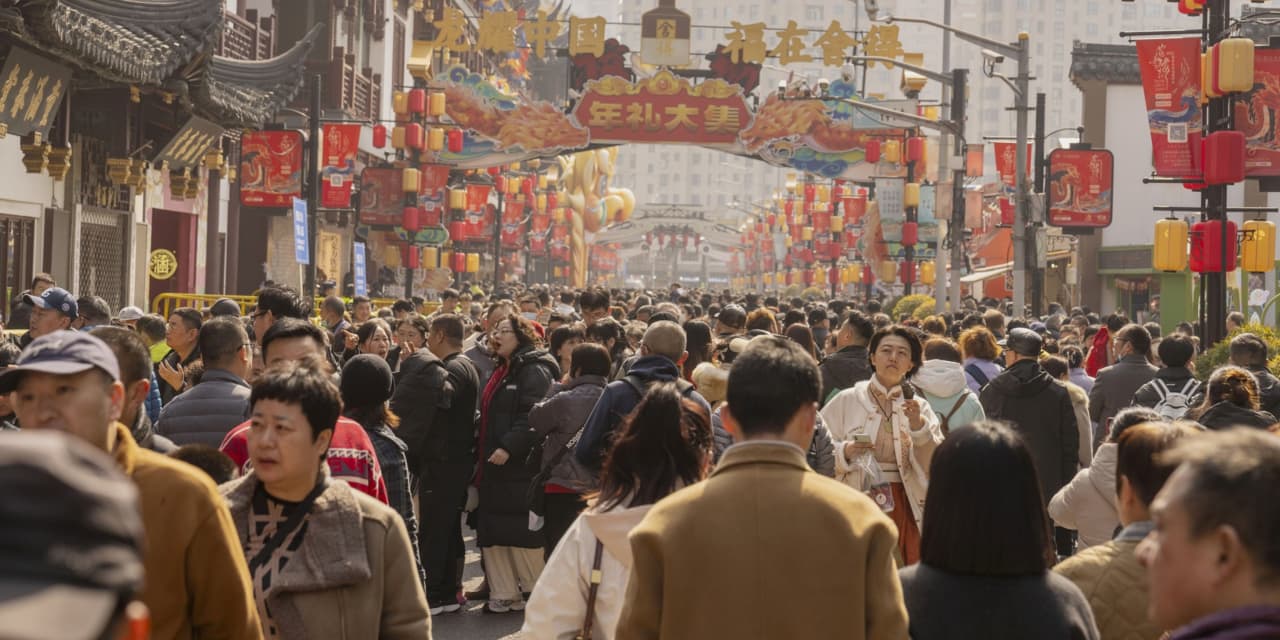All eyes are on China as it celebrates its top holiday, Lunar New Year, to measure whether its beleaguered economy has any juice after a post-Covid rebound failed to materialize.
State media and the government are touting robust domestic travel. Indeed, train and plane tickets are sold out, and numbers released by the Ministry of Transport are on par with 2019.
But that says little about consumption.
Unlike many Western holidays, Lunar New Year is a time of returning home, visiting nearby relatives, and dining with family—not a vacation getaway to Thailand for a week. Few independent commenters—analysts, consumers—believe the spending will extend much further than the homebound travel itself.
“As people celebrate the Chinese New Year, sentiment seems weak,” ING China analyst Lynn Song said in a note.
University graduate student Li Yuanyuan said she always celebrated the new year. A core part of that has been bringing hordes of local knickknacks for her cousins, and regional snacks for the family to consume and distribute to those she grew up with in her small town in Sichuan province.
“Everyone does it who moves away. It’s a sharing of specialties from your area with the people you return to see,” she said by phone from her hometown of Pengzhou, Sichuan.
“Some years I’d have an extra suitcase just for presents. This year, I just have a bag of local Zhejiang sausages,” she said, referring to the beloved cured meats from the eastern province where she attends university.
Asked about the shrinkage in gift-bringing, she cited a number of reasons. “It’s not what it was,” she said, referring to the holiday atmosphere. “The mood seems uninspired,” adding that “on top of that, my allowance was cut a bit this year.”
Besides red envelopes stuffed with China’s pink 100-yuan ($14) bills, gifts of choice during the new year are beverages—mostly the fiery alcohol baijiu—snacks such as nuts, fruits and candies, and vitamins and supplements that convey a sense of caring for the recipient’s health.
At least 50% or more of respondents said they were bringing these gifts home, in a survey by iiMedia Research.
“My mom already told me the gatherings and gift-giving this year will be more ‘conservative,’” Li said. ”She meant: Don’t put as much money inside red envelopes, dining out will be less fancy or we’ll just eat at home, and there’s a general shift away from gifts and more toward just getting together.”
Such a shift would mark a historical cultural change for what has been the standard experience for decades—particularly the 30-plus years of skyrocketing prosperity during China’s period of double-digit annual growth.
The subduing of something as seemingly small as how many 100-yuan bills are put in a red envelope, or how expensive a bottle of liquor costs is a microcosm of what many are predicting is the new China—one of much slower economic growth.
“It just makes sense,” said student Jiang Wenlian, from the city of Suzhou just outside Shanghai. “People—myself included—just aren’t as secure in their jobs. If you’re in a big city, all your money goes to rent. And if you own a house, that’s your savings, and the values are dropping.”
There are other signs of change. The culmination of Lunar New Year is the televised Spring Festival Gala, a glitzy hourslong showcase of stars and live performances. It is a near-mandate for the family to sit together and watch the event—the most-watched TV program in the world, often compared to the Oscars, if the Oscars drew 420 million domestic viewers instead of 19 million.
China scholars scour its carefully curated messaging through the program, themes that are emphasized to signal to viewers certain propaganda priorities.
A long-running theme was absent this year: the economy, prosperity, growth. These were always stressed during China’s boom times—an understandable accolade to remind a population that doesn’t vote for its leaders. But this year, the big themes stuck to anodyne cultural sloganeering.
“Amid lackluster economic performance, modest technological advancements, and ongoing decoupling from the West, China has turned to civilizational discourse as a source of national pride,” China international relations analyst Nick Carraway wrote in current affairs publication “The Diplomat.”
Write to [email protected]
Read the full article here




